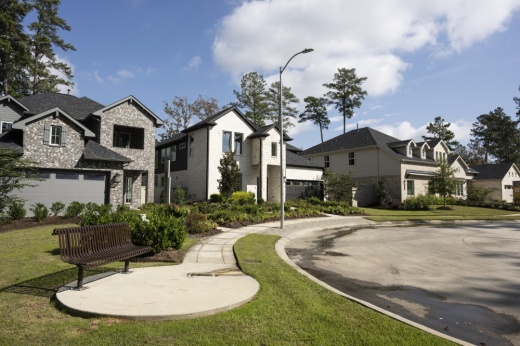Around a year and a half after instituting a development moratorium and extending it four times, the city of Magnolia continues to work on water infrastructure to increase its water capacity.
“A year ago, we had three wells,” City Administrator Don Doering said. “Now we have five, and we’re working on two more and then two more after that.”
The city’s focus on water infrastructure comes as developments—such as Magnolia Place, Magnolia Village, Heritage Green and the master-planned community Audubon, which completed its own water well last July—continue to progress.
Two-minute impact
The city has approximately 3,600 connections, with around 11,000 still expected to be needed within the next five years, city engineer Tim Robertson said.
“Things can change that are beyond our control that would either increase or maybe even decrease that [11,000] number,” Robertson said. “But I honestly don’t foresee it. Development in this area of Montgomery County and this particular area of this part of Texas is very, very hot.”
Having completed water wells Nos. 7 and 8 at a combined cost of around $7.73 million, Magnolia is now focused on building out wells Nos. 9 and 10.
“We have a pretty good plan laid out,” Robertson said. “[We’re] trying to do two wells per year to meet the demand that we think is coming and provide some redundancy in the system.”
Doering said much of the funding to pay for new wells is coming from impact fees, which are one-time fees collected to fund a new water user’s share of the city’s water or wastewater capacity. Magnolia raised its impact fees in May 2022 to $7,400 per single-family connection, according to prior reporting. Previously, impact fees were $4,800 per single-family connection.
“That’s what impact fees are there for, is to cover the future expansion,” Magnolia Mayor Todd Kana said.
The city also has around $15 million in reserves from selling certificates of obligation that could be used to fund future water infrastructure, Doering said in an April 9 email.
The details
Amid the city’s efforts, there are over 32,000 lots platted for future development, according to Magnolia ISD’s spring 2022 demographics report conducted by Zonda Education.
That development includes 3,000-acre master-planned community Audubon. Sam Yager III, executive vice president of Sam Yager Inc. and developer of Audubon, said a water well for the community was completed last July, which has allowed the development to continue building out.
“We would be behind [without the well],” Yager said. “We had commitments to our builders, so when we found out that the city was unable to provide the water, ... we knew immediately that what we needed to do was spring into action.”
Yager said Audubon’s well cost around $1.5 million to build, and after expanding it into a water plant, the total cost will be around $3 million. The water plant, which has been bid and awarded, will take around nine months to a year to complete.
“We just want to make sure that there’s nothing that would impede our ability to deliver additional lots to our builders or the ability of any of the other users in the project—the commercial users or the multifamily users—to continue with their development,” Yager said.
Meanwhile, Parkside Capital owns a roughly 30-acre tract next to Magnolia West High School anticipated to be a mix of commercial and build-to-rent residential development.
“The city of Magnolia has been very reasonable with us and worked with us, in particular on this tract, so we could go ahead and extend water and sewer lines,” Parkside Capital President Brett Walker said. “Now the only thing remaining is tying into the capacity that they’re constructing.”
Diving in deeper
Doering said the moratorium helps protect the city’s current developers.
“We’re not letting other, newer developments that have just arrived get in line ahead of [current developers],” Robertson said. “We’re trying to prioritize and meet our existing obligations.”
Robertson also said the moratorium helps the city issue new connections at a pace that doesn’t overwhelm its capacity.
“We have to make sure our infrastructure is there to do the connections and meet the regulatory requirements, but then also during that time, be responsible as we can be about issuing those connections,” Robertson said.
Another ripple effect of Magnolia’s water situation was the city hiring an in-house city engineer. Prior to Robertson’s appointment, Magnolia outsourced its engineering needs.
“[With] the numbers we’re looking at, he should instantly pay for himself,” Kana said.
The takeaway
The city has been slowly allocating new connections since last May, with the two new wells enabling 2,833 new connections, city officials said.
“It’s a very, very limited number that each development gets,” Robertson said. “That keeps new construction moving. It’s just keeping it at a pace that [makes sure] our current water system can withstand the demand.”
Magnolia plans to build two wells per year as needed, city officials said.
“The way I look at it is this community is in the middle of some pretty tough growing pains,” Robertson said. “And when those start, they generally continue for several years. And then it stops. ... The city gets caught up on the infrastructure. But there’s really no other way to do it.”





